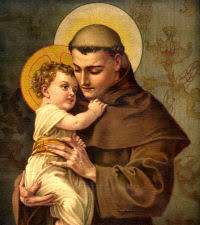HOMILY WEEK 10 04 – Year II
Entering the Reign of God:
Optional Memorial of St. Anthony of Padua
(1 Kg 18:41-46; Ps 65; Mt 5:20-26)
**************************************
“For I tell you, unless your righteousness exceeds that of the scribes and Pharisees, you will never enter the kingdom of heaven.”
Today’s reading and memorial invite us to live a religion of the heart rather than head, love and attraction rather than law and duty, and a holiness or righteousness flowing from a loving attitude rather than legalistic attitude.
A bit of background is needed to properly understand just what the “righteousness of the scribes and Pharisees” means. When the first temple build by King Solomon was dedicated, the “shekinah” or glory of God filled the temple so powerfully the priests had a hard time entering (1 Kg 8:10-11). However, over the centuries, the temple worship became so corrupt (Ezk 9:9) that during the time of Ezekiel the glory of God lifted up and left the temple in the direction of the East (Ezk 10:18-19).
After that temple was destroyed, the people were exiled, finally given permission to return and rebuilt the temple. When this second temple was dedicated, however, the glory of God did not return to the temple (Ezra 6:16-22). This always bothered the Jewish religious leaders, especially the Pharisees. Their reaction was to try to live the law perfectly, thinking that would bring the glory of God back to the temple. Perhaps that explains the dominant role the Pharisees and their scribes played in the Jewish religion up to the time of Jesus.
That also explains the intense focus of the Pharisees on law and keeping their commentaries on the law (Mishnah and Midrash) to the letter. They were good people trying to be good Jews – a mentality that persists to this day, according to our guide in Jerusalem: more important than the Torah is their need to know “what they need to do to be a good Jew.” The problem with this approach is it lends itself to earning one’s way to heaven, to a meritocracy and legalism that borders on a heresy known as Pelagianism, the belief that human will alone suffices without divine aid.
It is quite interesting how this kind of “righteousness” can sneak into our lives of faith even today. Robert, a dutiful Catholic farmer, used to say things like, “One has to merit heaven.” Without knowing it, his theology bordered on Pelagianism.
An example of this kind of “righteousness of the Pharisees” is the building of the Indian Residential School system across Canada, largely by the Oblates. One of our superior generals, on a trip to Canada in 1935, saw what was happening, assessed it for what it was – a focus on building impressive institutions rather than simply evangelizing and sharing the gospel – and warned the Oblates we were heading in the wrong direction. His warning went unheeded, for we were too caught up in the euphoria of “being like and competing with the other religions” at the time and kept on doing what we were doing. Now we realize this superior general was right, and the Oblates issued an apology at the Lac St Anne pilgrimage in 1991 for our role in that flawed system – but our “righteousness of the Pharisees” at that time kept us from a paradigm change of ministry.
Jesus then goes on to articulate how his teaching of heartfelt love surpasses the ancient teachings based on law used to earn merit in God’s eyes. The first criteria he presents is forgiveness: letting go of anger and judging others, even in our hearts. In Matthew 18:15, Jesus teaches us how to do that. Rather than fight, flee or freeze when hurt by another person, we are to share our hurt feelings with the person and let them go. How often? Seventy-seven times, which symbolized infinity.
The second criteria Jesus stresses is practicing the art of a humble apology and making amends, more important even than prayer and worship. We are to “leave our gift at the altar and first go and be reconciled,” apologize, try to make things right, then we can more credibly come and worship God.
Someone who really lived this was Velma. She was able to both forgive her abuser who sexually assaulted her when she was fourteen, and also apologize to him for how she had treated him for over thirty-five years. Her righteousness certainly surpassed that of the scribes and Pharisees.

St. Anthony of Padua
Today the Church honours St. Anthony of Padua, who was born in Lisbon, Portugal in 1195, although Padua claims him as their own. At 15, he joined the Canons Regular of Saint Augustine and studied intensely for 8 years, becoming an accomplished biblical scholar. He joined the Franciscans and was sent by Francis to teach his fellow friars in northern Italy, Bologna and then Padua. His reputation drew enormous crowds, and the power of his words converted them. Ill and exhausted, he died at age 36, so beloved and revered he was canonized within a year. His aid is invoked to help find lost objects.
The Eucharist is an experience of God’s unconditional, undeserved love, forgiveness and healing power, helping us enter into and live within the reign of God, and mandating us to go out as wounded healers, spreading that love to help others also enter.
May our celebration empower us to live a religion of the heart rather than head, love and attraction rather than law and duty, a holiness flowing from a loving attitude rather than legalistic attitude, and thus surpass the righteousness of the scribes and Pharisees so we can truly live in the kingdom of God.



